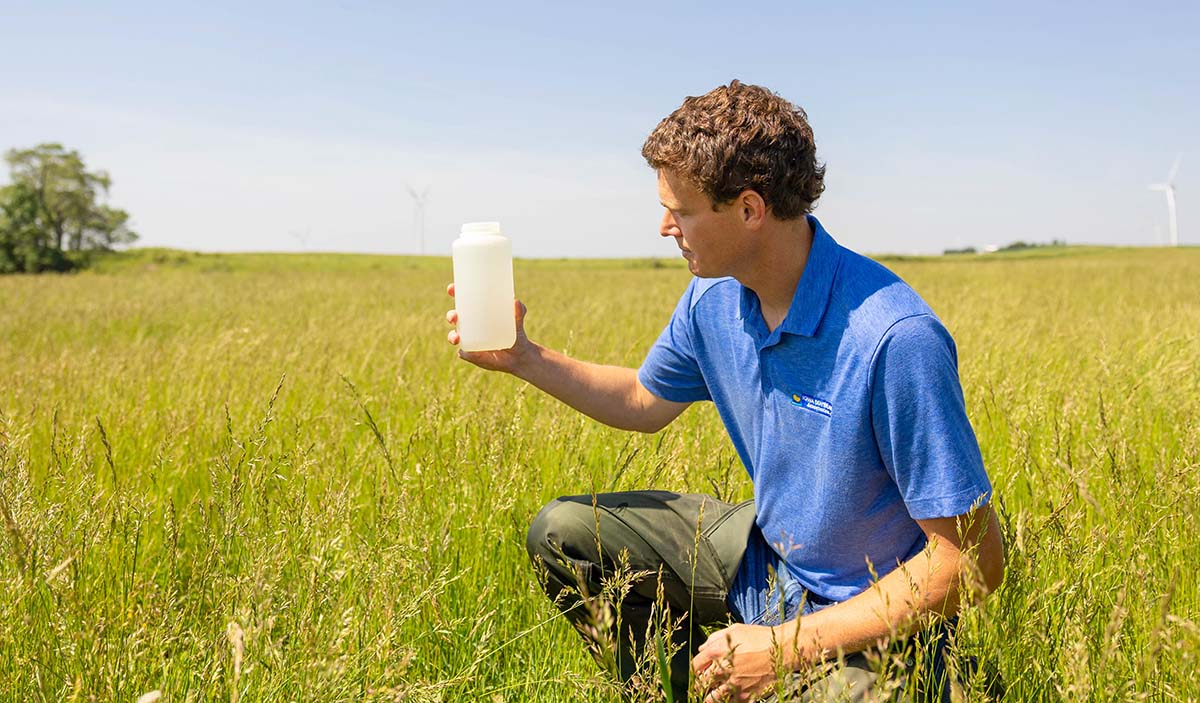
(Photo: Iowa Soybean Association / Joclyn Kuboushek)
Is your well still a reliable place for clean water?
October 2, 2025 | Kriss Nelson
Clean, safe drinking water is the foundation of healthy families and thriving communities. Public water supplies are closely regulated and tested, but thousands of Iowans depend on private wells for their daily drinking water.
Unlike public systems, private wells aren’t routinely monitored, placing the responsibility of safeguarding water quality on the well owner. Without consistent testing and proper upkeep, wells can become susceptible to contamination, putting households at risk.
The Iowa Source Water Protection Program, the Iowa Source Water Ag Collaborative and the Iowa Department of Health and Human Services are raising awareness of the importance of protecting Iowa’s drinking water and the resources available to private well owners. This week, known as Source Water Protection week, collaborators want to ensure Iowans are aware of the Private Well Grants program.
About the Private Wells Grants program
The Private Well Grants Program was established to alleviate the financial burden of maintaining and protecting private wells. The program funds assist well owners with the cost of testing their water for bacteria, nitrate and other potential contaminants. It also offers support for repairing or reconstructing wells that are no longer in good condition, helping ensure that they remain a safe and reliable source of water. Additionally, the program offers support for closing abandoned or unused wells. These wells, if left open, can act as direct channels for pollutants to enter groundwater, threatening individual households and other communities that may be using that aquifer.
Water stewardship
Supporting good water stewardship helps ensure that today’s families and future generations have access to safe drinking water.
The Iowa Soybean Association’s (ISA) Research Center for Farming Innovation (RCFI) works to protect source water by supporting conservation practices that improve water quality. All water is source water for someone or something, whether it’s a private well or a downstream community. Edge-of-field conservation practices, such as bioreactors, wetlands and oxbows, provide benefits for all water users.
“The Iowa Soybean Association encourages farmers and rural residents to test their private wells regularly and take steps to protect source water,” says Tony Seeman, ISA water lab service manager. “Whether it’s for drinking water or for livestock, water quality is always important.”
ISA’s water monitoring program
Routine water monitoring can provide the evidence a farmer needs to adjust management practices accordingly to reduce the amounts of nitrogen and other nutrients lost, whether through tile drainage to a stream or through groundwater.
RCFI’s conservation programming involves monitoring farmers’ water quality, analyzing water quality results and providing feedback annually.
ISA’s water monitoring team regularly collects samples from tile outlets, intakes and streams. Farmers receive updated reports throughout the growing season and a comprehensive analysis at the end of the growing year.
Samples are tested in-house at ISA’s accredited lab. The lab is certified by the U.S. Environmental Protection Agency through the Iowa Department of Natural Resources to analyze E. Coli bacteria, nitrates and fluoride under the Safe Drinking Water Act.
Private well owners who want to learn more about the Private Well Grants Program can learn more at the following this link or by contacting their county sanitarian.
Additional information about source water protection in Iowa and the Iowa Source Water Ag Collaborative can be found at https://www.iowasourcewater.org.
To learn more about ISA’s water lab, contact Seeman at aseeman@iasoybeans.com.
Written by Kriss Nelson.
Back